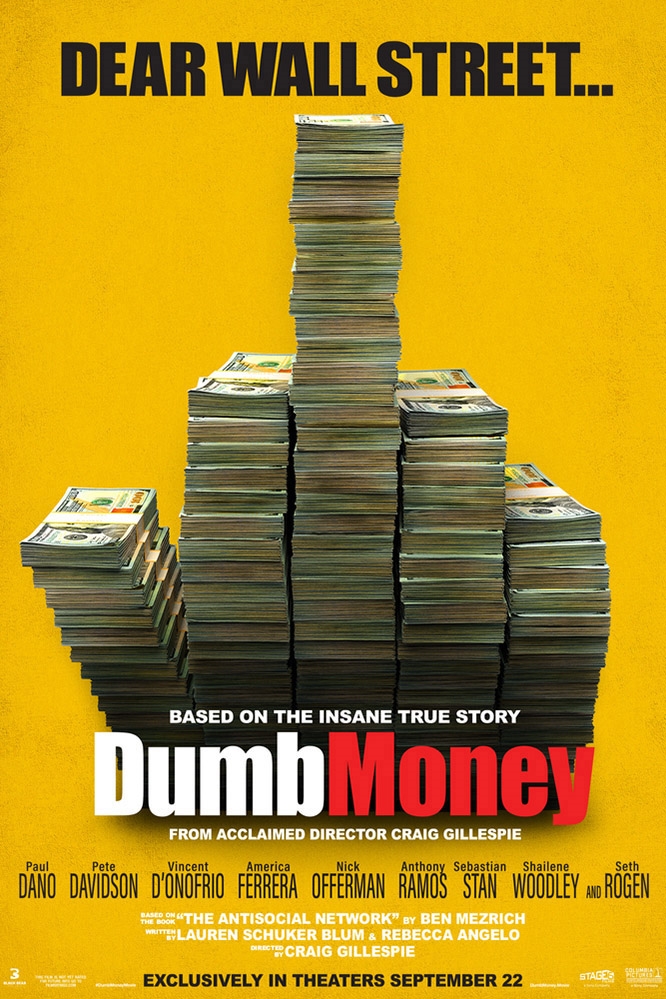There’s a natural inclination to write off “Dumb Money” as another “Wolf of Wall Street” or “The Big Short”-esque story that promotes itself as a sharp dramedy topped with a generous dose of financial lingo and stock market-induced frustrations. While the movie delivers on that expectation, its condemnation of Wall Street greed — both clever and comical in its approach — and underdog storyline is what sets it apart.
Released on Sept. 13, “Dumb Money,” like the films above, is based on a true story — and a relatively recent one at that. You might have seen headlines about the GameStop craze in early 2021 that morphed into a dramatic market saga and even involved a congressional hearing. The film follows the GameStop short squeeze brought about by individual investors belonging to the subreddit r/WallStreetBets, an event that dealt heavy blows to the big investment firms that shorted it, including the now-defunct Melvin Capital Management.
At the helm of this crusade against Wall Street is small-time financial analyst Keith Gill (Paul Dano) who moonlights as a streamer under the screen name “Roaring Kitty.” He invests heavily in GameStop’s stock and posts updates for his viewers who follow his lead, causing the stock to surge dramatically. These incidents happen to the dismay of the CEOs of hedge fund investment firms, who have been short selling the stock under the expectation the company would soon shutter, only to find the tables turned on them as they end up losing billions of dollars.
Movies centered around the stock market face the challenge of keeping audiences hooked on a story that, at its core, is about watching numbers on a screen go up and down. While there is a wealth of films that show this can be done, “Dumb Money,” in particular, faces the extra task of making an event that primarily unfolded in online spaces during the height of the pandemic look exciting and worthy of being shown on the big screen.
Director Craig Gillepsie translates this story to the screen effectively, and the fact that much of the events occurred virtually does not minimize its impact or emotion. He accomplishes this tall order thanks to two reasons, with the first being the movie’s all-out, kitschy celebration of meme culture. Because Reddit and its users play such a central role in the short squeeze, the presence of memes is only to be expected. In fact, the references are so predominant that even though it’s a movie about money, you don’t need to be a stock market aficionado to enjoy it.
The film maintains a consistent fast pace-paced and montage-like feel when representing activity occurring in online spaces, juxtaposing TikToks and other viral videos against clips taken from actual coverage of the event on business news shows.
“Dumb Money,” in particular, faces the extra task of making an event that primarily unfolded in online spaces during the height of the pandemic look exciting and worthy of being shown on the big screen.
You might ask, how can anyone take this movie seriously when it’s rife with outdated “stonks” memes, devotes a full minute to Anthony Ramos doing the “Savage” TikTok dance and follows the story of a guy who operates under the name “Roaring Kitty”? The answer: one can’t. But it gets away with this lack of seriousness precisely because the reality it’s based on is just as outlandish — an observation constantly emphasized by the film’s characters.
“Dumb Money” revels in its awkwardness, helped by Dano’s endearing portrayal of a nerdy character with a soft spot for cat paraphernalia and played up by Seth Rogen’s performance as a bumbling Wall Street big bad who faces the familiar struggle of not realizing you’re muted on Zoom.
Which leads me to my second reason for the film’s success: It’s dedicated to portraying 2021 as accurately as possible. That means empty malls and characters wearing masks whenever they step outside. It means Zoom classes and social distancing and respectfully depicting the struggles of essential workers.
I will admit that seeing this reality reflected on the big screen was uncomfortable at first. After all, it’s only been so long since we’ve returned to what we might now consider normal. Newer shows and movies have typically shied away from dealing with the subject of COVID-19, and when forced to confront it, the most you will see are passing references.
“Dumb Money” differs from that norm by confronting the reality of COVID-19 head-on and affording it an appropriate gravity. The bustling community interacting in online spaces contrasts sharply with the dimmed lights of the mall and its ghost town-esque atmosphere.
Ultimately, “Dumb Money” is a film with a lot of heart; it casts familiar faces — Pete Davidson, America Ferrera, Shailene Woodley and Ramos, among others — as ordinary people just trying to get by. It’s a story that unapologetically roots for the little guys. While this approach sets it apart from other big financial movies that glorify greed, I think it’s refreshing take makes “Dumb Money” deserving of the same iconic status.


